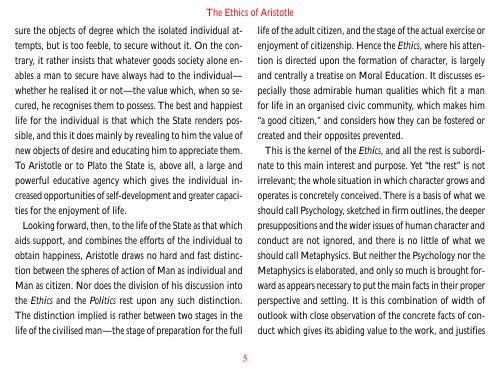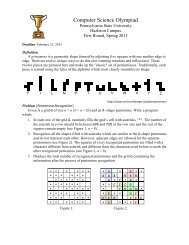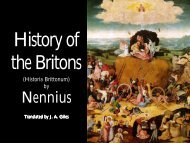- Page 2 and 3: Informe de Yerba Mate Nº 02 | [12/
- Page 6 and 7: The Ethics of Aristotlethe view of
- Page 8 and 9: The Ethics of Aristotlesent. From t
- Page 10 and 11: The Ethics of Aristotleof happiness
- Page 12 and 13: The Ethics of Aristotletheir correl
- Page 14 and 15: The Ethics of Aristotleof justice i
- Page 16 and 17: The Ethics of Aristotlemay be prese
- Page 18 and 19: The Ethics of Aristotledistractions
- Page 20 and 21: The Ethics of Aristotleit, by a sor
- Page 22 and 23: The Ethics of Aristotleupon what is
- Page 24 and 25: The Ethics of Aristotlegrandly and
- Page 26 and 27: The Ethics of Aristotlethose things
- Page 29: The Ethics of Aristotlefinal; and s
- Page 32 and 33: The Ethics of Aristotleand body res
- Page 34 and 35: The Ethics of Aristotleof some othe
- Page 36 and 37: The Ethics of Aristotlesame man hap
- Page 38 and 39: The Ethics of Aristotlesome have a
- Page 40 and 41: The Ethics of Aristotlethat of his
- Page 42 and 43: The Ethics of AristotleBOOK IIAgain
- Page 44 and 45: The Ethics of Aristotle[Sidenote: 1
- Page 46 and 47: The Ethics of AristotleThe followin
- Page 48 and 49: The Ethics of Aristotleenvy, joy, f
- Page 50 and 51: The Ethics of Aristotlemean: it is
- Page 52 and 53: The Ethics of Aristotleso, of cours
- Page 54 and 55:
The Ethics of Aristotlethe excess;
- Page 56 and 57:
The Ethics of Aristotlecentre of a
- Page 58 and 59:
The Ethics of Aristotlenothing; as
- Page 60 and 61:
The Ethics of Aristotlewe do not us
- Page 62 and 63:
The Ethics of AristotleNor do they
- Page 64 and 65:
The Ethics of AristotleBut we do de
- Page 66 and 67:
The Ethics of Aristotlehas been alr
- Page 68 and 69:
The Ethics of Aristotledoing evil a
- Page 70 and 71:
The Ethics of Aristotlemasters from
- Page 72 and 73:
The Ethics of Aristotlefrom a right
- Page 74 and 75:
The Ethics of Aristotlemen sometime
- Page 76 and 77:
The Ethics of Aristotleis dishonour
- Page 78 and 79:
The Ethics of Aristotlepained at th
- Page 80 and 81:
The Ethics of Aristotleought, and i
- Page 82 and 83:
The Ethics of Aristotleunchastened-
- Page 84 and 85:
The Ethics of Aristotledoing well b
- Page 86 and 87:
The Ethics of Aristotlewhich are co
- Page 88 and 89:
The Ethics of Aristotleyourself wit
- Page 90 and 91:
The Ethics of Aristotlea large scal
- Page 92 and 93:
The Ethics of AristotleI have descr
- Page 94 and 95:
The Ethics of Aristotleexternal adv
- Page 96 and 97:
The Ethics of AristotleThe Small-mi
- Page 98 and 99:
The Ethics of Aristotlemuch as he f
- Page 100 and 101:
The Ethics of Aristotlenot from any
- Page 102 and 103:
The Ethics of AristotleAnd he that
- Page 104 and 105:
The Ethics of AristotleWell then, a
- Page 106 and 107:
The Ethics of AristotleBOOK Vbut th
- Page 108 and 109:
The Ethics of Aristotleway somewhat
- Page 110 and 111:
The Ethics of Aristotlewhat it is,
- Page 112 and 113:
The Ethics of Aristotlebe called di
- Page 114 and 115:
The Ethics of Aristotlethe greater
- Page 116 and 117:
The Ethics of Aristotleother arts:
- Page 118 and 119:
The Ethics of Aristotlewhich the ju
- Page 120 and 121:
The Ethics of Aristotle[Sidenote: V
- Page 122 and 123:
The Ethics of Aristotleinvoluntary,
- Page 124 and 125:
The Ethics of Aristotledealt with u
- Page 126 and 127:
The Ethics of Aristotleunjustly, th
- Page 128 and 129:
The Ethics of Aristotleby ruling it
- Page 130 and 131:
The Ethics of AristotleFurther: Jus
- Page 132 and 133:
The Ethics of Aristotlelectual oper
- Page 134 and 135:
The Ethics of AristotleWisdom:” f
- Page 136 and 137:
The Ethics of Aristotleto that facu
- Page 138 and 139:
The Ethics of AristotleA corroborat
- Page 140 and 141:
The Ethics of Aristotlewhat is expe
- Page 142 and 143:
The Ethics of Aristotleend, because
- Page 144 and 145:
The Ethics of Aristotleis quite pla
- Page 146 and 147:
The Ethics of AristotleAPPENDIXof t
- Page 148 and 149:
The Ethics of AristotleBOOK VIIwhen
- Page 150 and 151:
The Ethics of Aristotlesomething el
- Page 152 and 153:
The Ethics of AristotleWell, the di
- Page 154 and 155:
The Ethics of AristotleAnd their sa
- Page 156 and 157:
The Ethics of Aristotleing that tit
- Page 158 and 159:
The Ethics of Aristotlecome to be s
- Page 160 and 161:
The Ethics of AristotleAgain, chara
- Page 162 and 163:
The Ethics of Aristotlefor doing th
- Page 164 and 165:
The Ethics of AristotleDemodocus sa
- Page 166 and 167:
The Ethics of Aristotlethe mean bet
- Page 168 and 169:
The Ethics of Aristotlepher, since
- Page 170 and 171:
The Ethics of Aristotlemust be bett
- Page 172 and 173:
The Ethics of Aristotleto be the be
- Page 174 and 175:
The Ethics of Aristotlemuch like th
- Page 176 and 177:
The Ethics of Aristotleman; some go
- Page 178 and 179:
The Ethics of Aristotleare three, i
- Page 180 and 181:
The Ethics of Aristotlemacy: for, a
- Page 182 and 183:
The Ethics of AristotleVFurther; ju
- Page 184 and 185:
The Ethics of Aristotlecould suppor
- Page 186 and 187:
The Ethics of Aristotlecases it is
- Page 188 and 189:
The Ethics of Aristotlewhat is gras
- Page 190 and 191:
The Ethics of Aristotlethis its inf
- Page 192 and 193:
The Ethics of Aristotleform: in Des
- Page 194 and 195:
The Ethics of Aristotleother consan
- Page 196 and 197:
The Ethics of Aristotleon: but stil
- Page 198 and 199:
The Ethics of AristotleLike rules t
- Page 200 and 201:
The Ethics of Aristotlewho first gi
- Page 202 and 203:
The Ethics of Aristotlegiving great
- Page 204 and 205:
The Ethics of Aristotleis the objec
- Page 206 and 207:
The Ethics of Aristotleanticipation
- Page 208 and 209:
The Ethics of Aristotledo not neces
- Page 210 and 211:
The Ethics of Aristotlethere is no
- Page 212 and 213:
The Ethics of Aristotleterm “Self
- Page 214 and 215:
The Ethics of Aristotleno need of F
- Page 216 and 217:
The Ethics of Aristotleis indefinit
- Page 218 and 219:
The Ethics of Aristotlebeing a kind
- Page 220 and 221:
The Ethics of Aristotlemost prized
- Page 222 and 223:
The Ethics of Aristotleall: “For
- Page 224 and 225:
The Ethics of Aristotlesure is a Mo
- Page 226 and 227:
The Ethics of Aristotlemay say; and
- Page 228 and 229:
The Ethics of Aristotlerelated, the
- Page 230 and 231:
The Ethics of Aristotleproduce a si
- Page 232 and 233:
The Ethics of Aristotleare so with
- Page 234 and 235:
The Ethics of AristotleExcellence t
- Page 236 and 237:
The Ethics of AristotleFurther, the
- Page 238 and 239:
The Ethics of Aristotle[Sidenote: 1
- Page 240 and 241:
The Ethics of Aristotlebelongs to t
- Page 242 and 243:
The Ethics of Aristotlegood; or, to
- Page 244 and 245:
The Ethics of Aristotlethey have it
- Page 246 and 247:
The Ethics of AristotleWhatever gai
- Page 248 and 249:
The Ethics of AristotleP 8, l. 2. P
- Page 250 and 251:
The Ethics of Aristotleproportionab
- Page 252 and 253:
The Ethics of Aristotleeither case
- Page 254 and 255:
The Ethics of Aristotleboth nations
- Page 256 and 257:
The Ethics of Aristotlea separate a
- Page 258 and 259:
The Ethics of Aristotle“The objec
- Page 260 and 261:
The Ethics of Aristotleto 3 (which
- Page 262 and 263:
The Ethics of Aristotlefeels himsel
- Page 264 and 265:
The Ethics of Aristotlefact our Mor
- Page 266 and 267:
The Ethics of Aristotlemoral consti
- Page 268 and 269:
The Ethics of AristotleP. 140, l. 2
- Page 270 and 271:
The Ethics of Aristotlegestions of
- Page 272 and 273:
The Ethics of Aristotlethe universa
- Page 274 and 275:
The Ethics of Aristotlewith despair
- Page 276 and 277:
The Ethics of AristotleP. 238, 1. 2














